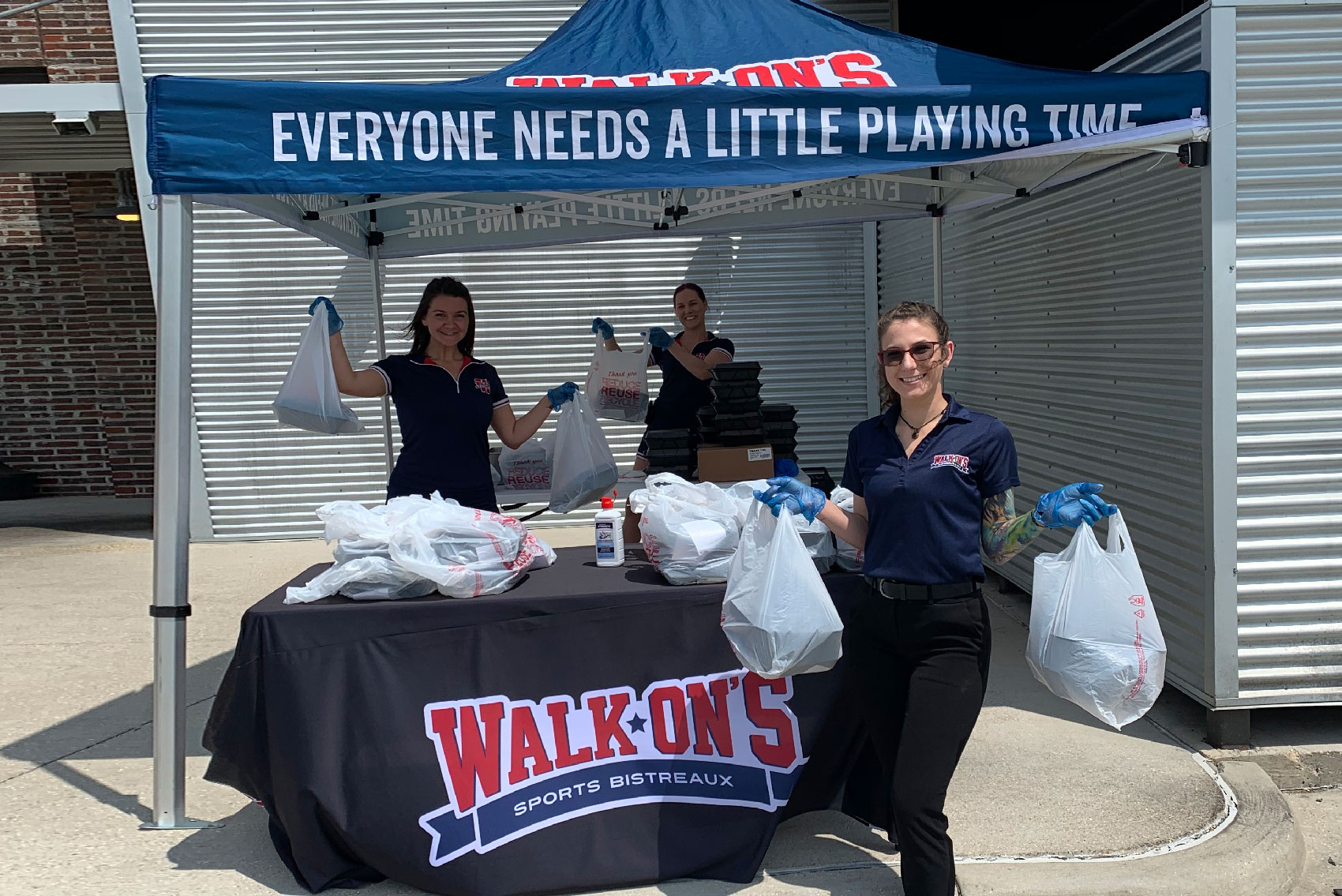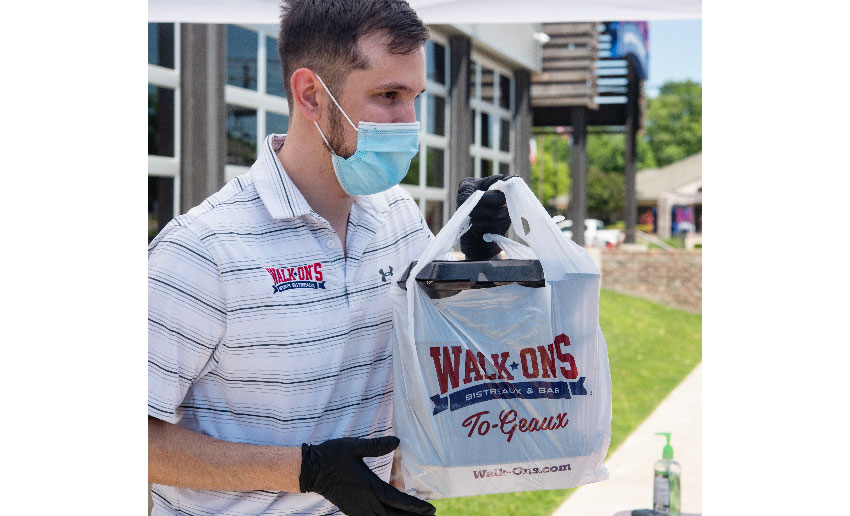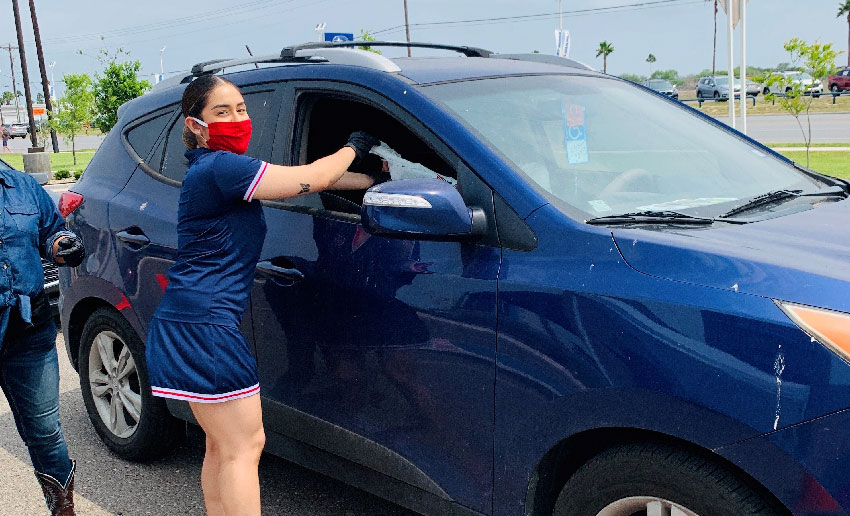
How Scrappy and Adaptive Marketing Helped Walk-On’s Find Success in 2020
Surviving and thriving in the face of a pandemic requires the courage to pivot. Walk-On’s Sports Bistreaux threw out their playbook when the rules of the game changed.
Walk-On’s Sports Bistreaux is willing to take on Alexander Hamilton in the young, scrappy and hungry competition.
With deep Louisiana roots, the 17-year-old franchise restaurant and bar’s story and culture is all about the grit and tenacity it takes to make it on and off the court. In the face of opening new restaurants during the midst of a pandemic, Erin Amadeo, their vice-president of marketing, says the organization stayed true to its roots.
Anyone who knows anything about college sports knows that to walk on and stay on a Division 1 primary sports team takes serious tenacity, humility and hope.
Fortunately for the hungry among us, Walk-On’s founders laid the groundwork for the organization’s success. Now led by Brandon Landry, who walked on to LSU’s basketball team alongside fellow-Walk-On’s founder Jack Warner, the dream continues.
Amadeo says the company’s culture continues to embody that same walk-on attitude — working hard and doing what needs to be done to keep the team winning.
“It’s the walk-on mentality — we can do anything, try anything. We are here. We are going to find a way. Underdog mentality.”
Erin Amadeo, Vice President of Marketing at Walk-On’s
Rooting for the Underdog
In the process of opening a string of new restaurants in the spring of 2020, Amadeo says the COVID-19 crisis gave the Walk-On’s team that chance to show what it was made of — and in true Walk-On’s fashion, the team stepped up.
Five days into their biggest campaign of the year, the Walk-On’s marketing team hit pause. “When the shutdown happened in March, we had just launched our March Madness campaign — our biggest promotion of the year,” Amadeo said.
“With a multitude of collateral pieces in place, we had to cancel,” Amadeo said. “We had to figure out how to adjust.”
At that point, Amadeo and Walk-On’s leadership had to make some tough decisions and had to do so quickly.
“From a corporate perspective, we quickly eliminated our national (promotional) budget,” Amadeo said. “Later, we abated our marketing royalties for our franchisees. We made a drastic effort to support our franchisees. We went guerrilla style.”
Keeping the Players Moving
While the main focus of Walk-On’s Game On Foundation had been to provide support for youth athletes and facilities, the organization saw an opportunity to help with a more immediate need — to provide meals for employees whose jobs were affected due to COVID-19.
“We quickly pivoted. We were very nimble,” Amadeo said. “We paid attention to the audience and it paid off for us.”

Changing the Game for Good
The Walk-On’s marketing team went on to accelerate and launch all of their digital platforms that were set for 2021. They got online ordering up and working in 14 days.
“We’ve thrown our calendars away. Restaurant marketing has changed forever. Point-of-purchase has changed. All of the granular details have changed.”
ERIN AMADEO, VICE PRESIDENT OF MARKETING AT WALK-ON’S
Perhaps some are wondering how an organization continues to operate a sports bar and restaurant in an era of diminishing sports. The Walk-On’s team is not discouraged.
“We’re discussing contingency plans – NASCAR, hockey. We’ve got plenty of other options, including potential match-ups between franchisees like Drew Brees and Dak Prescott. We’re talking about doing some unique things,” she said.
The post-pandemic Walk-On’s team can-do attitude seems to hinge on the way they set up that Furlough Kitchen — a drive-thru style free meal pickup for any furloughed worker, no matter who the former employer had been.
Walk-On’s and their non-profit organization, the Game On Foundation, made the Furlough Kitchen work within 48 hours.
Pre-pandemic, the Walk-On’s Game On Foundation focused its resources on the company’s roots — on the courts and fields, working to give more in Walk-On’s communities access to better sports facilities and equipment. The 501 (c)(3) non-profit organization turned on a dime when the pandemic hit.
The piece of the puzzle that seems to have convinced the Walk-On’s team that they could do anything was working with Furlough Kitchen in Dallas — a pop-up nonprofit that was was formed at the start of the pandemic, a dire, unprecedented time in the hospitality industry, to serve high-quality meals throughout the community. With the help and guidance of the original Furlough Kitchen team, the Walk-On’s Furlough Kitchen was up and running within 48 hours.
“Our Game On Foundation quickly altered its mission,” Amadeo said.
In fact, from March 31 through May 3, Walk-On’s Furlough Kitchen raised nearly $50,000 and provided about 33,000 free meals from 13 different Walk-On’s locations across five states. Amadeo said the quick-turn transformation to serve others proffered many benefits for Walk-On’s, but they didn’t do it for self-serving reasons.
“We took food that we wouldn’t normally serve. Competing vendors, like Reinhart and Cisco, both donated food. It didn’t matter,” she said. “We just worked together. We didn’t ask people if they lost their jobs. We just fed people. I think it’s important to note that we have not struggled to get employees back — I think there’s a connection.”
Katie Morris, Game On Foundation manager, said what impressed her the most was the confidence the Walk-On’s team had pulling off what seems, to some, like an impossible feat — adding that the company’s leadership was instrumental in keeping the company’s perspective positive through the early days of the crisis.
“Fundraising efforts, new roles and operational procedures that needed to be created virtually overnight, and the call for selfless team effort were all opportunities to us, not obstacles.”
Katie Morris, Manager for the Walk-On’s Game On Foundation
When the World Needed a Good Story
During that process, Walk-On’s earned 22 television segments or mentions, two radio interviews and 30 print/online features, which they estimate to total about $120,000 in earned media value and 3.5 million impressions. They focused heavily on influencers for promotional purposes.
“Surprisingly, they did it for free,” Amadeo said. “We were also able to bring employees back on payroll to do the work.”
The willingness of the influencers to do promotion for free was not a huge surprise to anyone paying attention. Through the years, Walk-On’s has built real relationships with celebrity athletes and throughout communities they serve.

Being the Community’s Restaurant
“We say all the time that we don’t want to be another restaurant in the community. We want to be a community’s restaurant,” Amadeo said.
Morris said the encouraging spirit, required by any walk-on that makes and stays on a team, permeated the experience. For example, Morris says nearly every email during the initial rush of shifting gears and changing course included the tagline: “This is a moment in time, not the end of time.”
Morris agrees with Amadeo that the demonstration of great leadership and a winning mindset was nothing new.
“We didn’t have to ‘sell’ the offer of stepping up or community service to our franchisees or team members. It was the obvious response, and I believe that’s a great way to summarize our culture,” Morris said. “Interruption in the everyday pattern can make or break a company. This is when culture matters most. When you work for a culture-driven company, one that was founded on values and mindset, a crisis allows the opportunity to make a positive impact, regardless of the obstacles.”
Amadeo says her big takeaway from the launch of the pandemic and a new way of doing business was that while the COVID-19 crisis created many obstacles for the restaurant industry, it also created an opportunity for Walk-On’s to step in and serve local communities — through quality meals for those unexpectedly in need, an avenue for eager donors to make an immediate impact and fulfilling work for team members and restaurant operators.
“As the effects of this crisis continue to evolve, Walk-On’s and the Game On Foundation aim to find creative, impactful solutions on how we can best serve our communities,” Amadeo said.
Growing, Adapting and Learning
Meanwhile, Walk-On’s keeps opening new restaurants — even in the face of a market that has shifted substantially. “We just opened our 43rd restaurant in Odessa. Since the pandemic struck, we’ve opened locations in Amarillo, Myrtle Beach, Orlando and in Spring, Texas that opened its doors during a to-go only mandate, now serving at 50% capacity — all brand-new markets. College Station opened two weeks before COVID hit,” she said. “Dak Prescott just signed on as a franchisee in the Dallas/Fort Worth area. Another franchisee we signed during COVID just bought Starkville, Meridian, Tupelo in Mississippi.” Remarkably, even in the face of drastic change, Amadeo says sales are only down overall 4% year over year.
“We’re operating at 50% capacity in every one of our markets — and we’re only down 4%, with some restaurant sales operating in the positive year over year.”
ERIN AMADEO, VICE PRESIDENT OF MARKETING AT WALK-ON’S
Pre COVID-19, Amadeo says only about 11% of restaurant sales were takeout, as compared with 20% in the months since.
“It’s been a blessing in ways,” she said. “I think we’ll keep a lot of what COVID has taught us.”
Young, scrappy and hungry is the way Walk-On’s likes to play its game. They work to be nimble and keep the people they serve top-of-mind — willing to call an audible, when conditions demand.
They are not throwing away their shot.

